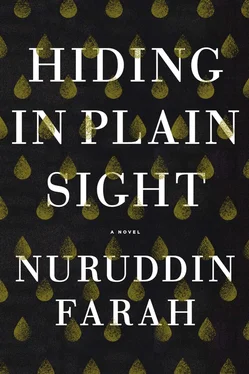“Wills are more than a word given, they are written and signed in the presence of witnesses,” says Salif. “And they are binding. Otherwise, not honoring them might create avoidable frictions within family units, and nobody wants frictions.”
Qamar draws long on the cigarette and waits for him to continue speaking. She holds the cigarette away from her face until he passes her the ashtray. Then she brushes the ash off and passes the cigarette back to him.
Salif takes a puff, and as he blows rings of smoke out, he thinks about cremations and what the Zoroastrians do: construct a raised structure on which the recently dead is exposed to scavenging birds. He cannot determine which is worse: to be interred in the ground, cremated, or become food for scavenging birds.
Qamar says, after having a toke on the cigarette, “How do you know all this, about the enforceability of wills, I mean?”
Salif replies, “My dad explained it to me.”
“Why would he tell you that sort of thing?”
“It is as if he knew that our mum would one day turn up and make unenforceable claims. So he warned me about it and said to rely only on Bella, whom he would make our legal guardian in the event he preceded her.”
“My dad never spoke about this type of thing to me.”
“Maybe your situation is different and he needn’t do that.”
“Or maybe…”
“You see, Dad hoped I’d become a lawyer,” says Salif.
Salif receives the cigarette now that it is his turn to have a puff, then closes his eyes after drawing on it, holding the smoke in his mouth and releasing it gently.
“I think your mum has her madcap ideas,” says Qamar.
Salif has a hungry long draw on the cigarette for a second time before passing it to Qamar. And then he feasts his eyes on the well-presented series of photos of a young and an old Nina Simone and of Miles Davis playing a gig in a dive in Japan. Salif prefers African music in all its forms to American or European music. He has a stash of records from all over the continent and is disinterested in rock, country, or any music from elsewhere. And he doesn’t make a statement with his choice of music. Qamar is a statements girl and declares that jazz is the music to cherish. Curiously, when the two talk about jazz, literature, or anything serious, they speak in English, in which they feel more comfortable. They lapse into Somali when the topic is one of immediate concern: cigarettes, food, cinema money, or cash for more mobile phone minutes. At present, they are speaking in Somali interspersed with English words.
“Ever listen to Somali music?” Salif asks.
“I’ve had Somali music up to here.” Qamar touches her throat. “I had to listen to it as a child every time I got into the car, being picked up from school or taken shopping. Also, if I want to hear Somali music, I go downstairs: My mother has it on all the time. Except we seldom hear it in the house lately because Mum is in no mood to play music, any music, these days.”
“But you are your own person now, or so you think.”
“Where are you going with this?”
“You become more tolerant of the choices other people make when you are your own person. A girl your age with your background should allow others to make their choices and not take things in a personal way, as one does when one is a child. Wouldn’t you agree?”
The cigarette is finished. Qamar picks up the ashtray, steps into the adjoining bathroom, empties the ashtray into the toilet, and flushes it before she returns to the bed.
She says, “Have we become our own persons?”
“Listening to your parents’ choice of music and fussing are run of the mill experiences during the transition from the person our parents want us to be and the person we eventually become. Along the way, one loses a few things and gains others.”
“Life is boring, life is exciting.”
Qamar takes a sip of water from the glass on her side of the bed.
Salif says, “I bet it would be tedious to eat caviar in the morning, caviar in the afternoon, and caviar in the evening. In the end, you would want to eat anything but caviar.”
As the children of Somali parents in exile, they have each been drilled in Somali identity. Yet Qamar remembers when she once asked one of her uncles in English to pay for an ice cream cone and he answered that he would do so only if she made the same request in Somali. She refused to oblige, choosing to forfeit the treat rather than be forced to do something against her will. When she repeated the anecdote to Salif, he said she was being foolish. Qamar retorted, “I am not someone’s project. Speak Somali or else? I won’t. And I can live comfortably without ice cream, thank you.”
Salif now says, “In Somalia, a woman is not thought of as a complete person in her own right. She has become male society’s project in the making, which is why we refer to ‘women’s organizations’ as ‘mothers’ organizations.’ The same is true of Kenyan society, in fact, more so than in Somali society. You will notice that every older man is addressed as ‘Father,’ which I see as part of the project. In short, I think that African societies view having children as an integral part of project making.”
“I won’t think of myself as part of anyone’s project.”
“Will you have children or not?”
“Supposing I do?”
“Then you will be complying with society’s wish.”
“No, I won’t.”
“Yes, you will.”
“Don’t you talk like that to me,” Qamar said.
“Anything that requires advance planning is just a project by another name. If, from the look of things, children do well, then the project has been a great success. Look at you and me: We are but seeds projected from our ancestral Somali tree. It’s too bad we Somali offspring are unable to have direct knowledge of the country and its cultural nuances. The very parents who want us to become and remain Somali tell us it is unsafe for us to go there.”
“They have a point,” Qamar says.
“Don’t I know it?”
“You’ve no business putting your life at risk,” says Qamar.
“Yet the European passport on which I travel is to me a mere document permitting me to legally board flights, fill in forms, go into and out of other lands — and have some form of identity.”
“Why do you have a European passport?” Qamar asks. “Was it via your mum?”
“No,” says Salif. “Our EU passports were granted to us thanks to my dad’s working for the UN. Another way of gerrymandering the boundaries of identity.”
“Hence the question,” Qamar says.
“Question, what question?”
“What does it mean to be Somali in this day and age?”
“What about your Kenyan papers?”
“Our father obtained Kenyan citizenship through bribery after living here for decades as an undocumented refugee.”
“I had no idea.”
“Yes, they were declared stateless when they first arrived, along with all the other Somalis fleeing the civil war. Eventually, they got Kenyan papers, but I do not think of myself as a Kenyan since I am not welcomed as such. I am Somali, and my loyalty is to Somalia, which I’ve never visited and do not know. My attitude toward Kenya will change the day the people of this country accept me as Kenyan and do not tell me to go back to my own country!”
Salif says, “Our hearts are not where our papers are.”
He lights yet another cigarette, but when he passes it to Qamar, she shakes her head no.
“Who knows what will become of people like us?” she says.
“We are difficult to define, aren’t we?”
Dahaba calls to Salif. He stubs out his cigarette and Qamar hides the ashtray before Dahaba appears in the doorway, leaning against the jamb.
Читать дальше












